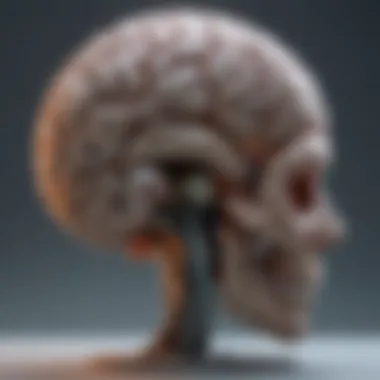Anxiety and Brain Tumors: Understanding the Connection


Intro
The relationship between anxiety disorders and brain tumors is a complex and often overlooked area in both psychological and medical fields. Individuals diagnosed with brain tumors face a myriad of challenges, from the physical manifestations of their condition to the emotional upheaval that comes with such a life-altering diagnosis. Anxiety often becomes a prominent feature of their experience, intertwining with the realities of living with a brain tumor. This article will delve into the intricate dynamics at play, exploring how anxiety affects individuals and how these effects can be mitigated through various treatment strategies. We will begin with an overview of the existing research, followed by current trends in science that aim to address both mental and physical health in patients with brain tumors.
Research Overview
Methodological Approaches
Research into the intersection of anxiety and brain tumors employs various methodological approaches. Quantitative studies frequently focus on statistical analyses of anxiety prevalence among patients diagnosed with brain tumors. This may involve standardized questionnaires like the Hospital Anxiety and Depression Scale, which can provide insights into the levels and types of anxiety experienced.
Qualitative research can highlight personal narratives, revealing how individuals perceive and cope with their feelings of anxiety. Case studies and interviews can offer deep insight into the emotional landscape faced by these patients during their treatment journey. Through these varied approaches, researchers seek to illuminate the multiple dimensions of anxiety in the context of brain tumors, allowing for a more nuanced understanding of this intersection.
Significance and Implications
Understanding the relationship between brain tumors and anxiety is essential for several reasons. First, it impacts the quality of life for patients. Studies show that elevated anxiety levels can lead to poorer treatment adherence and negative health outcomes. Furthermore, addressing anxiety in these patients is vital for their overall mental health and well-being.
Secondly, the implications extend to healthcare providers. Training for oncologists and neurologists to recognize and treat anxiety can enhance patient care. The broader healthcare system may need to consider integrated approaches, combining psychological support with medical treatment.
"Addressing mental health is as critical as treating the tumor itself. It influences recovery, satisfaction, and overall well-being."
Current Trends in Science
Innovative Techniques and Tools
Current trends focus on innovative techniques to assess and manage anxiety in patients with brain tumors. Technological advancements have enabled the use of telehealth services, making psychological support more accessible. Mobile applications tailored for mental health can also help patients track their anxiety symptoms and provide coping strategies.
Emerging research in neuroscience is looking into the effects of brain tumors on specific brain areas responsible for mood regulation. Neuroimaging techniques like fMRI are being explored to understand better how tumors impact cognitive functions and emotional responses.
Interdisciplinary Connections
The relationship between oncology and psychiatry has gained more attention. Collaborative strategies that include psychologists, social workers, and primary care providers alongside oncologists are becoming more common. This interdisciplinary approach aims not just to treat the physical disease but also to ensure comprehensive mental health management, enhancing support systems for patients.
Preamble to Anxiety and Brain Tumors
The intersection of anxiety disorders and brain tumors presents a complex and multifaceted area of study. Understanding this link is crucial for effective patient care and treatment strategies. Attention is increasingly directed towards how brain tumors not only impact physical health but also exert profound psychological effects. The nuances of anxiety in the context of a brain tumor diagnosis merit focused inquiry to comprehend the multifarious outcomes experienced by patients.
A thorough investigation reveals that individuals coping with brain tumors often face high levels of anxiety, stemming from multiple factors including the fear of the unknown, potential physical symptoms, and the overall prognosis. Recognizing these elements provides a foundation for developing supportive interventions that address mental health alongside medical treatment.
Understanding Anxiety
Anxiety is a normal response to stress but can become debilitating when it persists without an identifiable cause. In the context of brain tumors, anxiety may manifest due to the fear of personal health deterioration or the impact of the disease on family dynamics. Symptoms such as excessive worry, restlessness, and difficulty concentrating can significantly affect an individual's overall quality of life.
Individuals may experience anxiety at various stages of their journey, from diagnosis to treatment and recovery. Each phase presents unique challenges and fears that can exacerbate emotional distress. Understanding these specific anxieties is essential for healthcare providers. Tailoring psychological support may lead to improved outcomes for those diagnosed with brain tumors.
Overview of Brain Tumors
Brain tumors are abnormal growths of cells in the brain. They can be benign or malignant, and their effects wholly depend on their location, size, and type. Tumors can disrupt normal brain function and lead to a range of neurological deficits, which can further feed into a patient's anxiety.
For instance, a tumor located in areas responsible for motor control or speech can lead to significant alterations in physical capabilities, triggering anxiety about independence and future quality of life. Various forms of treatment, including surgery, chemotherapy, and radiation, may contribute to additional psychological strain, highlighting the need for a comprehensive approach that considers both physical and mental health.
"Recognizing the psychological ramifications of brain tumors is as important as addressing the physiological aspects of treatment."
In summary, exploring the relationship between anxiety and brain tumors is not merely an academic exercise. It plays a pivotal role in providing holistic patient care and addressing the unique needs that arise when facing such a daunting diagnosis.
The Psychological Impact of Brain Tumors
The psychological impact of brain tumors is a crucial area of discussion within the context of this article. Understanding how the diagnosis of a brain tumor can affect an individual’s mental health is essential, given the profound implications on a patient’s quality of life. The emotional turmoil that accompanies such a diagnosis often influences treatment outcomes, recovery processes, and overall wellbeing. Identifying the psychological repercussions allows healthcare professionals to provide tailored support, addressing both physical and mental health needs.


Diagnosis and Emotional Responses
The diagnosis of a brain tumor can elicit a wide range of emotional responses. Patients may experience shock, fear, and anxiety immediately upon receiving their diagnosis. These feelings can stem from uncertainty about treatment options, potential outcomes, and the effects of the tumor on daily functioning. Research indicates that up to 40% of brain tumor patients experience clinically significant anxiety disorders. This statistic highlights the necessity of early intervention and support services.
Feelings of isolation are common as well. Patients often feel disconnected from others who may not understand the nature of their condition. Additionally, the stigma surrounding brain tumors can exacerbate feelings of hopelessness. It is vital that healthcare professionals validate these emotional responses and recognize them as legitimate psychological challenges rather than side effects of treatment.
"Understanding and addressing emotional responses in brain tumor patients can significantly impact their recovery journey."
Coping Mechanisms and Resilience
While the psychological burden of a brain tumor diagnosis is significant, many individuals develop coping mechanisms that foster resilience. These coping strategies can range from emotional support networks, such as family and friends, to engaging in support groups specifically tailored for cancer patients. A notable aspect of resilience is the ability to find meaning in the experience, through expressions of hope and personal growth despite circumstances.
Mindfulness and other therapeutic techniques also play an important role. Several studies have shown that practices such as meditation and cognitive behavioral therapy can alleviate anxiety symptoms. By helping patients regain a sense of control, these techniques contribute to enhanced emotional resilience.
In summary, understanding the psychological impact of brain tumors is essential for a holistic treatment approach. Emotional responses to diagnosis should be recognized and addressed, while also promoting coping strategies that can strengthen resilience. This not only improves the patients' quality of life but also enhances their capacity to deal with the challenges posed by their diagnosis.
Neurological Factors Influencing Anxiety
Understanding how neurological factors influence anxiety is crucial in the context of brain tumors. These tumors can affect various regions of the brain, leading to notable changes in mood, cognition, and emotional responses. The interplay between tumor location and its effects, along with the biological mechanisms that underpin anxiety disorders, is intricate. An exploration of these factors offers insight into why patients with brain tumors might experience heightened anxiety levels. This understanding is fundamental for developing targeted treatment approaches that can alleviate anxiety and improve patients' quality of life.
Tumor Location and Its Effects
Tumor location plays a significant role in determining the psychological and emotional state of a patient. Different areas of the brain govern various functions. For instance, tumors located in the frontal lobe may disrupt executive functions, which include decision-making and emotional regulation.
Changes in behavior can often be observed in patients with tumors in this area, contributing to anxiety. Furthermore, intra-tumoral inflammation in adjacent brain structures can provoke feelings of stress and worry, intensifying anxiety symptoms. Ultimately, understanding the tumor location can help in predicting the psychological impact, guiding the management and treatment plans for affected individuals.
Biological Mechanisms of Anxiety Disorders
The biological mechanisms that underlie anxiety disorders are varied and complex.
Neurotransmitter Imbalances
Neurotransmitter imbalances significantly contribute to anxiety disorders. Key neurotransmitters, such as serotonin, dopamine, and norepinephrine, have essential roles in mood regulation. When these neurotransmitters are out of balance, individuals may experience heightened anxiety.
A key characteristic of neurotransmitter imbalances is their variability among individuals. This variability is a beneficial aspect because it opens avenues for personalized treatment. The unique feature of neurotransmitter imbalances is that they can often be targeted with pharmacological interventions. However, the disadvantage lies in the potential side effects of these treatments, which can affect adherence to prescribed therapy.
Hormonal Responses
Hormonal responses also play a critical role in anxiety, particularly concerning the stress response. When an individual faces stress, the body releases hormones such as cortisol. This release can initiate a cascade of effects that heighten feelings of anxiety.
A key characteristic of hormonal responses is their rapidity; the body can adapt quickly to stressors. This responsiveness is a popular topic in this article, as it highlights how physiological changes can exacerbate anxiety. The unique feature of hormonal responses is their potential dual effect: while they can lead to temporary anxiety relief, chronic activation can result in a detrimental spiral of anxiety and stress-related disorders. Thus, monitoring hormonal levels in patients with brain tumors could yield vital insights for anxiety management strategies.
Research on Anxiety in Patients with Brain Tumors
Understanding the intersection of anxiety disorders and brain tumors is vital for both clinical practice and academic inquiry. This research addresses significant gaps in knowledge about how brain tumors affect mental health, particularly anxiety levels. Anxiety can profoundly influence the quality of life in patients diagnosed with brain tumors. Evaluating the prevalence of anxiety and exploring long-term findings can inform treatment protocols and improve patient care.
Relevant research underlines the necessity to view patients holistically and suggests that integrative treatment approaches should include both neurological and psychological support.
Prevalence of Anxiety Disorders
Anxiety disorders are notably common among patients with brain tumors. Studies indicate that the occurrence of anxiety may be influenced by several factors, including the type of tumor, its location, the treatment process, and the individual’s personal psychological history.
Research shows that
- Approximately 30-40% of brain tumor patients experience clinically significant anxiety levels.
- Higher rates of anxiety can be observed in patients who are undergoing treatment, including surgery, chemotherapy, or radiation.
This prevalence emphasizes the need for careful screening for anxiety in this patient population. It is essential to understand that the presence of anxiety can not only reduce the effectiveness of treatment but can also impede recovery.


Longitudinal Studies and Findings
Longitudinal studies provide critical insights into how anxiety levels fluctuate over the course of treatment and recovery for patients with brain tumors. These studies track patients over time, capturing the evolution of anxiety symptoms as health statuses change.
Key findings from various longitudinal research include:
- Initial Diagnosis Impact: Anxiety levels are generally highest at the point of diagnosis, when uncertainty and fear are at their peak.
- Post-Treatment Variability: Many patients experience a decrease in anxiety post-treatment. However, some individuals may continue to struggle with anxiety due to ongoing health issues or fears of recurrence.
- Long-term Effects: Awareness of anxiety persists even years after treatment. Some research indicates that follow-up care should include psychological support to ensure that anxiety does not become a chronic issue.
The significance of these studies lies in their ability to inform healthcare providers about the potential trajectory of anxiety symptoms. They highlight the necessity of early interventions and ongoing psychological support throughout the treatment continuum and beyond.
"Integrating mental health evaluations into routine cancer care can significantly enhance overall patient outcomes."
Future research needs to address the mechanisms behind these fluctuations and how best to tailor treatment strategies to manage anxiety effectively for those facing the challenges of brain tumors.
Treatment Approaches for Anxiety in Brain Tumor Patients
Treatment of anxiety in patients with brain tumors presents unique challenges and opportunities. Recognizing anxiety's impact on quality of life is essential in this context. Effective treatment not only addresses the psychological aspects but also acknowledges way how the tumor affects mental health. The goal is to provide relief while considering the overall health of the patient.
Psychotherapy Options
Cognitive Behavioral Therapy (CBT)
Cognitive Behavioral Therapy, commonly known as CBT, plays a significant role in treating anxiety among brain tumor patients. It focuses on the relationship between thoughts, feelings, and behaviors. This structured approach helps patients identify and reshape negative thought patterns, which can be heightened due to their medical condition.
Key characteristics of CBT include its focus on problem-solving and the use of specific techniques tailored to individual needs. This makes it a popular choice because it is typically short-term and can lead to various coping strategies that improve emotional well-being. Importantly, during treatment, patients learn to manage stress, which often contributes to their anxiety.
One unique feature of CBT is its application across different anxiety disorders, making it versatile. However, some patients may find it challenging to engage in the cognitive restructuring aspect, leading to frustration and possible drop-out from the therapy.
Support Groups
Support groups offer another valuable avenue for managing anxiety in brain tumor patients. These groups allow individuals to share experiences and feelings in a safe environment. Their collective experiences can help normalize the emotional struggles associated with anxiety.
A key characteristic of support groups is the sense of community they provide. This connection is comforting for many, as it fosters a feeling of not being alone in their experiences. Support groups can also motivate individuals to continue seeking treatment and provide practical advice from peers who are facing similar situations.
However, the unique feature of these groups is the variability in individual responses. Some might not resonate with the dynamics or find the experience overwhelming. Balancing personal comfort with the potential benefits is essential.
Pharmacological Interventions
Antidepressants
Antidepressants represent a core component of pharmacological treatment for anxiety in brain tumor patients. They work by altering levels of neurotransmitters in the brain, which can help improve mood and reduce anxiety. These medications can show effectiveness in managing symptoms during treatment phases.
The key characteristic of antidepressants is their ability to be tailored to a patient's specific needs. Commonly prescribed types include selective serotonin reuptake inhibitors (SSRIs). They are favored for their relatively mild side effects compared to older classes of antidepressants.
One unique feature is the time frame needed before noticing benefits, often requiring several weeks for effectiveness. Some individuals may find this delay frustrating, potentially impacting their willingness to continue medication.
Anxiolytics
Anxiolytics are another class of medications often used to manage anxiety symptoms in patients with brain tumors. These medications provide rapid relief for acute anxiety episodes, making them crucial for situations where immediate relief is desired.
A key characteristic of anxiolytics is their quick onset of action. Many patients may first encounter this class of drugs due to their efficacy in anxiety management. Benzodiazepines are a commonly used type in this category.
However, a unique feature of anxiolytics is their potential for dependency when used long-term. Therefore, medical supervision is critical to ensure that these medications are used appropriately and to manage any withdrawal symptoms when discontinuing.
By combining psychotherapy with pharmacological interventions, healthcare providers can create a comprehensive treatment plan. This approach recognizes the complex interplay between the psychological impacts of brain tumors and the resulting anxiety, paving the way for improved patient outcomes.
The Importance of Integrated Care


Integrated care plays a pivotal role in managing the intersection of anxiety and brain tumors. Patients face not only the physical aspects of their diagnosis but also significant psychological challenges. Therefore, coordinating care between oncologists and psychologists is essential for delivering holistic treatment. This comprehensive approach ensures that patients receive the necessary support for both their mental and physical health, acknowledging that each aspect can significantly impact the other.
The benefits of integrating care are multifold. A well-coordinated team can streamline treatment plans, minimizing delays caused by communication barriers. Additionally, having both an oncologist and a psychologist on the same page allows for a better understanding of how a patient’s psychological state can influence their response to treatment. For example, anxiety might exacerbate physical symptoms or lead to increased treatment side effects; hence, it is critical to address both areas simultaneously.
In this integrated care model, it’s important to consider the various elements involved:
- Communication: Open lines of communication among health care providers can enhance care continuity.
- Tailored Treatment Plans: Treatment should be customized to meet the specific needs of individuals, addressing both tumor management and mental health.
- Education and Support: Informed patients can make better decisions and manage their conditions more effectively. Providing educational resources helps facilitate this understanding.
By weaving together the expertise of both mental health professionals and oncologists, healthcare providers can better manage the complexities associated with brain tumors and anxiety.
Collaboration between Oncologists and Psychologists
Collaboration between oncologists and psychologists is a foundational element of integrated care. This partnership allows for a more thorough assessment and treatment of patients. Oncologists are typically focused on the biological and physical aspects of cancer care, while psychologists contribute by addressing emotional responses and mental health challenges. This multidisciplinary approach ensures comprehensive care.
Psychologists can help identify anxiety symptoms that may go unnoticed due to the predominant focus on the tumor's management. For oncologists, awareness of the psychological impacts of treatment can change how they prescribe therapies or manage side effects. Regular meetings between these professionals can help in developing joint assessment tools to monitor both mental and physical health indicators effectively.
Holistic Treatment Models
Holistic treatment models emphasize the need for treating the whole person, not just the disease. This approach integrates various therapeutic modalities to address mental, emotional, and physical health. Methods might include a combination of psychotherapy, medication, lifestyle changes, and support systems tailored to each patient’s needs.
Some key aspects of holistic treatment models are:
- Mindfulness Practices: Techniques like meditation and yoga can help reduce anxiety and improve overall well-being.
- Nutrition and Exercise: Healthy eating and regular physical activity can have positive effects on both mood and physical health.
- Social Support: Encouraging participation in support groups nurtures a sense of community and understanding among patients.
By adopting a holistic view, healthcare providers can enhance treatment adherence and improve overall patient satisfaction. Understanding that both physical and psychological health are interlinked leads to better recovery outcomes.
Future Directions in Research
The relationship between anxiety and brain tumors is a complex and multifaceted issue. As research progresses, it is crucial to explore future directions aimed at enriching our understanding of this intersection. The future research can provide additional insight into patient care, treatment strategies, and underlying biological mechanisms. It highlights the necessity for collaboration across disciplines to address both the neurological and psychological aspects of brain tumors and anxiety.
Exploring Innovative Therapeutic Approaches
As researchers look ahead, innovative therapeutic approaches will be vital for enhancing patient outcomes. One area of potential development involves integrating advances in technology into treatment programs. For example, using teletherapy could expand access to psychological support for patients who may find it difficult to attend in-person sessions.
Another promising area is the exploration of psychopharmacology alongside traditional treatment methods. New classes of medications that target both anxiety and tumor-related symptoms could emerge. This dual approach may offer more comprehensive support for individuals, providing both mental health benefits and neurological support. The incorporation of mindfulness and meditation techniques into standard treatment protocols might also prove beneficial in reducing anxiety levels and improving overall well-being.
Advances in Neuroscience and Their Implications
Ongoing progress in neuroscience presents opportunities to understand better how tumors affect brain function and mental health. Patients with brain tumors often experience unique challenges due to the location and nature of their conditions.
Recent studies have shown that certain tumor locations can directly influence emotional regulation, highlighting the need for tailored interventions. In parallel, research into how brain connectivity impacts anxiety can pave the way for novel strategies aimed at optimizing mental health outcomes in this population.
Moreover, neuroimaging techniques can be employed to identify specific patterns of brain activity associated with anxiety in individuals with brain tumors. This knowledge can inform personalized treatment plans based on individual brain function. By understanding the biological underpinnings of anxiety in this context, researchers can develop targeted interventions that cater to the specific needs of patients.
"Understanding the intricate mechanisms of brain tumors provides insights that can lead to improved therapeutic outcomes for anxiety sufferers."
Epilogue
The conclusion of this article is pivotal in synthesizing the nuanced connection between anxiety and brain tumors. The intricate interplay of psychological and physiological factors deserves close attention, particularly due to its implications for treatment and patient care. Psychosocial stressors often escalate in individuals confronting brain tumors, compounding the anxiety they may already feel due to their diagnosis. Consequently, mental health should be treated as a priority alongside physical health. This holistic perspective not only enhances patient outcomes but can also lead to more personalized treatment strategies.
Summarizing the Key Takeaways
Various key points emerge from this discussion:
- Interrelation between Conditions: Anxiety often correlates with brain tumor diagnosis, affecting the mental state of patients.
- Diverse Treatment Options: Both psychotherapy and pharmacological interventions are essential in managing anxiety. Integrative care enhances the quality of life for patients.
- Research Gaps: More investigations are needed to fully understand the connection of specific tumor types and locations with anxiety levels.
- Holistic Approach: A blended methodology focusing on both mental and physical health shapes better treatment pathways.
Encouraging Ongoing Dialogue and Research
Continuous investigation into the intersection of anxiety and brain tumors will provide valuable insights and tailor treatment frameworks. The complexities involved warrant an ongoing discussion among professionals across multiple disciplines. Such dialogue can facilitate collaboration between oncologists, psychologists, and researchers.
Additionally, it is crucial to disseminate information to a broader audience to break the stigma around discussing mental health in oncology settings. By promoting education and awareness, stakeholders can empower patients and families, helping them navigate the emotional landscape associated with brain tumors. Ideas for future research should be encouraged as they expand our understanding and potentially lead to innovative therapies. Research initiatives could include:
- Longitudinal studies to monitor anxiety levels over time in brain tumor patients.
- Clinical trials on new therapeutic interventions.
- Surveys assessing the psychological impact post-treatment.



